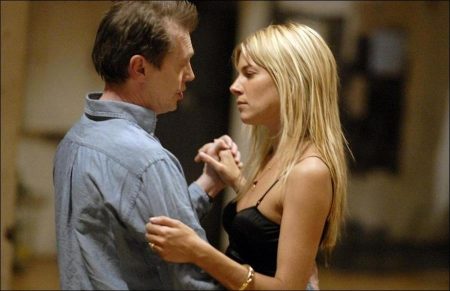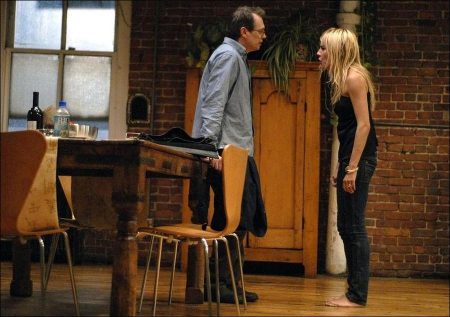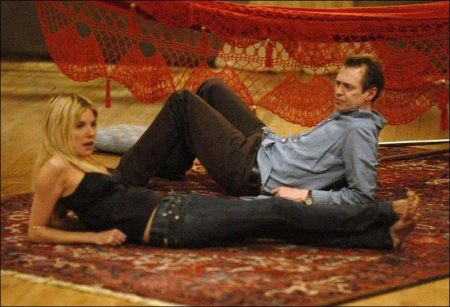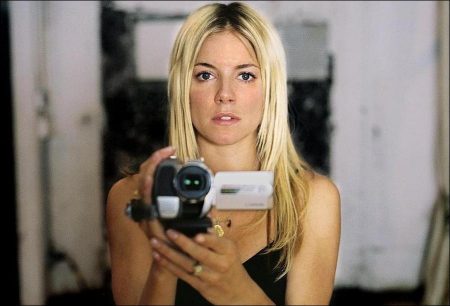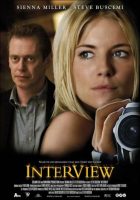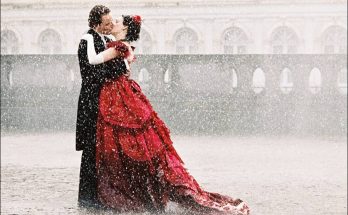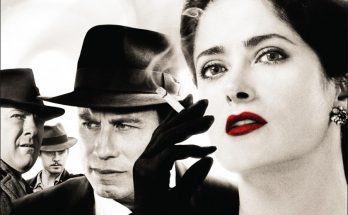Tagline: A journalist and a starlet take on media, truth and celebrity.
Self-destructive journalist Pierre Peders (Steve Buscemi) is no stranger to violence and inhumanity. Having made his name as a war reporter, he has traveled the world seeing some of the most horrifying sights imaginable. So he feels that his current puff-piece assignment, an interview with pop diva, TV and movie star Katya (Sienna Miller), is beneath his dignity. The two meet in a restaurant and, instantly, it’s a collision of two worlds-Pierre’s serious political focus and Katya’s superficial world of celebrity. But perhaps all is not as it appears.
When Pierre is slightly injured in a traffic accident inadvertently caused by Katya-she’s the proverbial girl who causes traffic accidents-they end up in Katya’s spacious loft for a long night of talking, drinking, sparring, and coming close to a sort of embattled intimacy. Each is scarred in their own way, aching from deep, hidden pain. But honest revelations give way to punishing deceptions. Their confrontation evolves into a passionate verbal chess game spiked with wit, intrigue and sexual tension, capped with a riveting twist ending.
Interview is a remake of Dutch film maker Theo van Gogh’s 2003 movie of the same name. The American version, which premiered in 2007, stars Steve Buscemi as Pierre Peders (originally played by Pierre Bokma), a fading political journalist interviewing a soap opera star, Katya, played by Sienna Miller (originally played by Katja Schuurman). This film also features Tara Elders as Maggie, Molly Griffith as a waitress, and Philippe Vonlanthen as an autograph seeker. Steve Buscemi is also a director of this American adaptation. Katja Schuurman, the actress who played Sienna Miller’s part in the original movie, has a small cameo as a woman leaving a limo towards the end of the movie.
Triple Theo
INTERVIEW is the first film completed in a project called Triple Theo. Triple Theo’s aim—beyond creating three great films—is to realize the vision of acclaimed international filmmaker Theo van Gogh, whose murder on November 2, 2004 was motivated by political and religious intolerance.
Before his death, van Gogh (great-grandson of Vincent van Gogh’s brother Theo) decided to remake three of his Dutchlanguage films in English, in a New York City setting. All three films are intense character dramas created in a dynamic, stripped-down style using innovative, low-budget filmmaking techniques and a dedicated crew of collaborators.
Van Gogh’s murder impelled his longtime producer, Gijs van de Westelaken, and his American counterpart, Bruce Weiss, to approach New York filmmakers about bringing the plan to fruition. Director and actor Steve Buscemi was the first to commit to the project, recommending his friend and colleague Stanley Tucci, who also signed on, along with director and actor John Turturro. That all three directors are also actors is a testament to van Gogh’s ability to create rich characters and vivid dialogue.
As Westelaken explains, “The films all have a central and very universal theme: the battles between men and women. We are really touched that Steve, Stanley and John have come onboard this project to help realize Theo’s dream.”
Westalaken continues, “With Theo’s death, we felt it would be a shame to let his unique language of filmmaking come to an end.” In addition to the original Interview (2003), the two other van Gogh films selected were 06 (1994) and Blind Date (1996). For Weiss, these relationship-driven films epitomized Theo’s sensibilities, and would translate well. “I think anyone who’s ever been in a relationship can identify with something in Theo’s films. Whether the language is English, Dutch, French, it doesn’t really matter. I think the themes are very universal.”
Theo van Gogh and his longtime crew, led by Director of Photography Thomas Kist, developed and perfected a fast-paced, forceful method of using three digital cameras running at all takes, with one camera trained on each character in these two-person dramas and one camera capturing middle and master shots. Kist and other key members of van Gogh’s crew worked with Buscemi in the filming of INTERVIEW.
Buscemi talks about how he used van Gogh’s method and adapted it to his own filmmaking style. Next up in the Triple Theo trilogy will be BLIND DATE, directed by Stanley Tucci, starring Tucci opposite Patricia Clarkson. John Turturro’s adaptation of 06 will also be filming this summer. As with INTERVIEW, both shoots will employ Theo van Gogh’s camera crew and techniques. Triple Theo carries out one tragically lost filmmaker’s vision, while expressing the individual artistry of a trio of New York filmmakers.
Steve Buscemi Talks About Interview
INTERVIEW has been an unusual and interesting project for me from the start. I was moved by the producers’ commitment to Theo van Gogh, and intrigued with the idea of carrying out his vision, but I never would have taken on the film if it didn’t capture my own interest as a filmmaker. I wanted to keep with the spirit of the original film, but also explore how we could make it our own.
I was the first to sign on to Triple Theo—so I got dibs on INTERVIEW, which resonated with me the most. The original had so many elements that attracted me: the vivid characters, the tension and conflict, but also the cutting humor and surprise. I like it when the location becomes another character in the film, and Katya’s loft definitely takes on that role, in Theo’s version and in mine.
On Theo van Gogh
I didn’t know Theo’s work before his murder. I knew of him—probably the family name made him stick in my mind—and of course I was saddened and appalled when he was killed. Now that I’m familiar with his films and his filmmaking methods, I’m a great admirer of the intensity he generates with just a few powerful elements—the manwoman interplay, a tight, simple plotline, and great dialogue.
And I love the way Theo loved actors. That shows in his work. INTERVIEW was written for those particular actors. The original and real-life Katja, Katja Schuurman, really is a huge commercial movie star, and INTERVIEW gave her the chance to look ironically at that persona and at the same time showcase her acting abilities.
On Comparing the Two INTERVIEW Versions
I admired the rhythm of the dialogue in the original—the way those two characters sparred with words and the momentum that created. But we found that it didn’t always work the same in English, in the New York setting, so we had to create a different rhythm. The Dutch version—and maybe the Dutch language, the Dutch culture—is possibly more blunt. Plus Theo’s a bit of a surrealist—his INTERVIEW reminded me a little of a Bunuel film where opposing characters are trapped in a room with each other and mysteriously unable to separate. I guess I’m more of a realist, and I looked for more of a justification for them being together for so long.
On Using Theo van Gogh’s Filmmaking Technique
Theo’s Director of Photography, Thomas Kist, and his camera crew were part of the package of making the film. I was really intrigued with working with them and trying Theo’s method—three handheld cameras at all times, one on each actor, one on a master or medium shot. Theo usually started by concentrating on the close-ups and working out to the master, which is more or less the opposite of how we tend to work here. It keeps the actors very much on their toes, and it was fun to try a new way of working.
Theo’s method helped avoid the look of a filmed stage play, which could easily happen with two characters locked together in a closed location. We were free to prowl around the loft, and the dynamics between Sienna and me could unfurl in a real-life, unbroken way. It wasn’t improvisatory—we were scripted and rehearsed, and some shots were planned—but using those long takes, with the camera on you at all times, really heightens the moment and creates lots of visual energy.
We rehearsed for two weeks and shot very quickly in nine nights. All that footage makes editing a challenge—post-production took a long time. Using Theo’s techniques and crew was part of the homage, but it was liberating in a way to me as well. It’s kind of like when you direct something like The Sopranos—there’s a structure you have to adhere to, and the challenge is to get creative within that structure.
On Acting and Directing
I had to let go of control, somewhat, and really trust the camera department and my assistant, Doesjka van Hoogdalem, who had assisted Theo on the original. Between shots I would watch certain takes on the monitor and discuss framing and performances, but while I was acting it was necessary for me to let that go. I had faith in the Dutch and American crew to follow their instincts while I was on camera. It was a really nice collaboration.
On the Lead Characters
I couldn’t play Pierre if I didn’t find some kinship with him. I like him, even with his flaws. I love characters that are unpredictable. Pierre and Katya both have plenty of flaws, but they’re both injured beings, and they sense that pain in common. That’s how they get so intimate so quickly.
Sienna did a great job bringing Katya to life. She had fun with the character and brought a lot of humor as well as depth to the performance. I was really impressed with her commitment and talent, and she was also a joy to work with.
Steve Buscemi (Pierre Peders)
Steve Buscemi has built a career out of portraying some of the most unique and unforgettable characters in recent cinema. His prolific career has teamed him with many of today’s most original and acclaimed filmmakers.
2007 has already been a busy year with Interview and the Chris Rock comedy I Think I Love My Wife; the Adam Sandler comedy I Now Pronounce You Chuck and Larry, directed by Dennis Dugan, which comes out in July; the animated feature in production, IGOR directed by Anthony Leondis; and Delirious, written and directed by Tom DiCillo to be released in the fall.
Buscemi won the Independent Spirit Award, The New York Film Critics Award and was nominated for a Golden Globe for his role in MGM’s Ghost World (2001) directed by Terry Zwigoff, co-starring Thora Birch and Scarlett Johansson. In 2006 he collaborated with Zwigoff again on Art School Confidential.
Also in 2006, he appeared in the French film Paris Je t’Aime; in the comic thriller Monster House; and in Charlotte’s Web as the voice of Templeton the rat.
Buscemi has also worked extensively in television. He was nominated in 2001 for an Emmy and DGA Award for directing the “Pine Barrens” episode during the fourth season of HBO’s The Sopranos. He then followed it up with a Best Supporting Actor Emmy nomination for his role as Tony Blundetto in season five of the cable series.
In 2005 he premiered his third directorial feature, Lonesome Jim, a comedydrama about a dysfunctional family, at The Sundance Film Festival, and in 2005 he also was seen on screen in Michael Bay’s The Island and Romance & Cigarettes, written and directed by John Turturro.
Other acting projects in his prolific career include roles in Big Fish, Mr. Deeds, Spy Kids 2: The Island of Lost Dreams, The Grey Zone, Love in the Time of Money, 13 Moons, Double Whammy, and the HBO telefilm The Laramie Project. He has also provided the voices for characters in the animated features: Pixar’s Monsters, Inc. and Columbia Pictures’ Final Fantasy.
Born in Brooklyn, New York, Buscemi began to show an interest in drama while in his last year of high school. Soon after, he moved to Manhattan to study acting with John Strasberg. There he and a fellow actor/writer, Mark Boone Junior, began writing and performing their own theatre pieces in performance spaces and downtown theatres. This soon led to his being cast in his first lead role in Bill Sherwood’s Parting Glances as a musician with AIDS.
Since then, he has become the actor of choice for many of the best directors in the business. His resume includes Jim Jarmusch’s Mystery Train for which he received an IFP Spirit Award Nomination; Alexandre Rockwell’s 1992 Sundance Film Festival Jury Award-winner In the Soup; Martin Scorcese’s New York Stories; the Coen Brothers’ Millers Crossing, Barton Fink, the Academy Award-winning Fargo and The Big Lebowski; Stanley Tucci’s The Imposters; the Jerry Bruckheimer productions Con Air and Armageddon; Tom DiCillo’s Sundance Film Festival award-winning Living in Oblivion with Dermot Mulroney and Catherine Keener; Twenty Bucks; John Carpenter’s Escape From L.A. with Kurt Russell; Desperado; Paramount’s Domestic Disturbance opposite John Travolta and Vince Vaughn; Things to Do in Denver When You’re Dead; Alexandre Rockwell’s Somebody to Love with Rosie Perez, in which he played a transvestite taxi dancer; an IFP Spirit Award-winning performance as Mr. Pink in Quentin Tarantino’s Reservoir Dogs; Robert Altman’s Kansas City; and numerous cameo appearances in films such as Rising Sun, The Hudsucker Proxy, Big Daddy, The Wedding Singer and other films.
In addition to his talents as an actor, Buscemi has proven to be a respected writer and a director, as well. His first project was a short film entitled What Happened to Pete, which was featured at several film festivals including Rotterdam and Locarno, and aired on the Bravo Network. He marked his full-length feature film directorial debut in 1996 with Trees Lounge, which he also wrote and starred in.
The film, which co-starred Chloe Sevigny, Samuel L. Jackson, and Anthony LaPaglia, made its debut in the Directors’ Fortnight at the 1996 Cannes Film Festival. Buscemi’s second feature film as a director, Animal Factory, told the story of a young man sent to prison in an unjustly harsh sentence, who eventually becomes a product of his environment. The film, based on a book by Edward Bunker, starred Willem Dafoe and Edward Furlong, and premiered at the 2000 Sundance Film Festival.
Selected Credits
Selected Feature Films
2008 Igor
2007 I Now Pronounce You Chuck and Larry
2007 I Think I Love My Wife
2007 Interview
2006 Charlotte’s Web
2006 Delirious
2006 Monster House
2006 Paris Je t’aime
2006 Art School Confidential
2003 Coffee and Cigarettes
2002 Monsters, Inc. (voice)
2001 The Grey Zone
2001 Ghost World
1998 Armageddon
1998 The Big Lebowski
1998 The Wedding Singer
1997 Con Air
1996 Trees Lounge
1996 Fargo
1995 Living in Oblivion
1992 Reservoir Dogs
1991 Barton Fink
1990 Miller’s Crossing
1990 King of New York
1989 Mystery Train
1986 Parting Glances
Selected Awards
2004 Emmy Award nomination for his role in The Sopranos
2002 Chicago Film Critics Association Award, Best Supporting Actor, Ghost World
2002 Independent Spirit Award, Best Supporting Actor, Ghost World
2002 National Society of Film Critics USA Award, Best Supporting Actor, Ghost World
2002 Vancouver Film Critics Circle, Best Actor, Ghost World
2001 New York Film Critics Circle Award, Best Supporting Actor, Ghost World
2001 San Diego Film Critics Society Awards, Special Award for Body of Work
1993 Independent Spirit Award, Best Supporting Actor, Reservoir Dogs
Sienna Miller (Katya)
Sienna Miller was born in New York on the 28th December 1981, the youngest daughter of Ed and Jo Miller. She spent the majority of her childhood in London and Wiltshire. She was educated at Heathfield School in Berkshire where she showed a keen interest in the theatre, both recreationally and as part of her A Level curriculum.
After a year out traveling she went on to study drama at the Lee Strasberg Institute in New York. In 2000 she starred in the off- Broadway production of “Independence” at the Neighborhood Playhouse.
Miller’s breakthrough came in 2001 with a role in the BBC series Bedtime. She then went on to land the female lead role alongside Mark Valley, in Keen Eddie, created by J.H. Wyman, a sitcom about a New York City policeman who is sent to London and ends up sharing a flat with a beautiful young woman named Fiona, (Miller).
Sienna’s film debut came in Layer Cake, the Matthew Vaughn hit film based on JJ Connelly’s London crime novel about a successful cocaine dealer XXXX (Daniel Craig), who earned a respected place among England’s Mafia elite and plans an early retirement from the business.
Sienna plays the alluring Tammy, who captivates and distracts XXXX. Sienna was then cast in the part of Nikki, a beautiful but unstable party girl, in Charles Shyer’s high profile remake of the1960’s classic Alfie. She stars alongside Jude Law, Susan Sarandon, Marisa Tomei, Jane Krakowski and Nia Long.
In 2005 Sienna co-starred opposite Heath Ledger in Lasse Halstrom’s production of Casanova. She plays the part of Francesca, the only woman Casanova fails to seduce. Lasse Halstrom comments on her role saying that “Francesca is an early feminist, and I wanted someone with a strong personality and intelligence. Sienna has the kind of charisma and charm that makes you believe in a character. I think she is a natural talent.”
She has shown further versatility as the fragile Edie Sedgwick in 2006’s Factory Girl directed by George Hickenlooper.
Still to come in 2007 are starring roles in Gregory MacKenzie’s romantic Camille; Matthew Vaughn’s fantasy Stardust; and Rawson
Marshall Thurber’s comic drama The Mysteries of Pittsburgh. Winning acclaim for her work on the stage as well, Sienna was cast in the part of Celia in the Young Vic’s production of Shakespeare’s ‘As you Like it,’ at the Wyndhams Theatre in London’s West End. She starred alongside Helen McCrory, Dominic West and Reece Shearsmith. The production received rave reviews.
Selected Credits
Feature Films
2007 The Mysteries of Pittsburgh
2007 Stardust
2007 Camille
2006 Interview
2006 Factory Girl
2005 Casanova
2004 Alfie
2004 Layer Cake
2002 The Ride
2002 High Speed
2001 South Kensington
Awards
2006 No. 2 on AskMen.com’s Top 99 Most Desirable Women of 2006
2005 Empire Award for Best Newcomer (UK) for Alfie and Layer Cake
2005 No. 48 on Maxim Magazine’s Hot 100 of 2005
Interview (2007)
Directed by: Steve Buscemi
Starring: Steve Buscemi, Siena Miller, Michael Buscemi, Tara Elders, Molly Griffith, Elizabeth Bracco, James Villemaire, Wayne Wilcox, Philippe Vonlanthen
Screenplay by: David Schechter, Steve Buscemi
Production Design by: Loren Weeks
Cinematography by: Thomas Kist
Film Editing by: Kate Williams
Costume Design by: Victoria Farrell
Set Decoration by: Christina Tonkin Noble
Music by: Evan Lurie
MPAA Rating: R for language inculding sexual references, and some drug use.
Distributed by: Sony Pictures Classics
Release Date: July 13, 2007
Visits: 82
